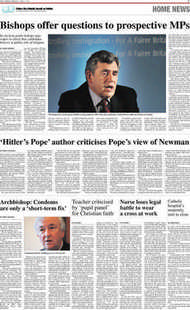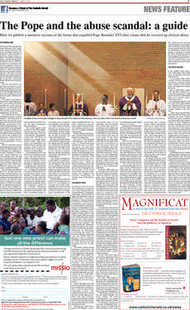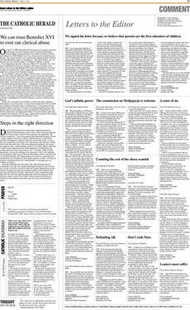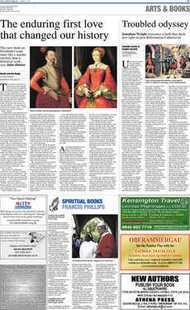Page 1, 9th April 2010
Page 1
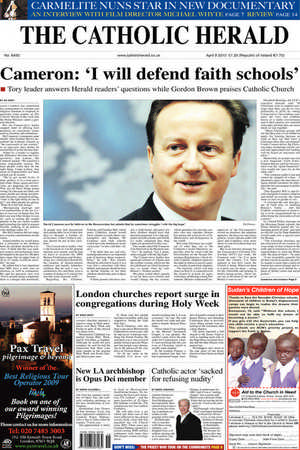
Report an error
Noticed an error on this page?If you've noticed an error in this article please click here to report it.
Tags
Share
Related articles
Impact On The Conservatives By Freddy Gray Conservative...
Cameron Claims Jesus Would Back Gay Rights Agenda
'ed Balls Chose To Attack Faith Schools'
We Must Protect Our Schools From Political Persecution
The Great May Gamble
Cameron: ‘I will defend faith schools’
■ Tory leader answers Herald readers’ questions while Gordon Brown praises Catholic Church
BY ED WEST
DAVID CAMERON has underlined his commitment to families and religious freedom in response to questions from readers of The Catholic Herald in the week that the Prime Minister called a general election.
But the Conservative leader stopped short of offering firm promises on conscience issues such as abortion and euthanasia.
Mr Cameron’s comments came shortly after Gordon Brown described the Catholic Church as “the conscience of our country” in an interview days before he named May 6 as the election date.
Asked by a reader to explain the difference between the Conservatives and Labour, Mr Cameron argued: “We stand for a more responsible society. We back people when they do the right thing. Under Labour, that sense of responsibility has been sucked out of society.
“We’ve got record levels of debt, politics is in a total mess, and crime, drugs, gangs and incivility are plaguing our streets. Why are all these things going wrong? It’s because too often, too many people are taking irresponsible decisions. Instead of asking, ‘what is the right thing for me to do?’, too often people are asking, ‘What do I feel like doing?’ “Recognising marriage and civil partnerships in the tax system is one way of doing that, but there are also other things we can do, such as ending the couple penalty in the tax credits system and extending the right to request flexible working to all parents with children under 18.” But Mr Cameron did not make any concrete commitments on life issues.
Asked whether he would press for a reduction in the abortion limit, he said there should be a review. “I think that the way medical science and technology have developed in the past few decades does mean that an upper limit of 20 or 22 weeks would be sensible,” he said.
He added that it was important that MPs have a free vote on abortion, as well as euthanasia. He said his personal view was “that if assisted dying is legalised, there is a danger that terminally ill people may feel pressurised into ending their lives if they feel they’ve become a burden on loved ones. I don’t believe anyone should be put in this position.” The Conservative leader, who is the favourite to win the general election next month, said he had no plans to overturn the 2008 Human Fertilisation and Embryology Act, which had allowed for the creation of human-animal embryos and legally fatherless children. But he said it was “a contentious Act, and there were a number of things in it which I for one had some concerns with”.
Regarding the Children, Schools and Families Bill, which many Catholics feared would force schools to teach about contraception and abortion, Mr Cameron said faith schools would have the freedom to teach such issues “in line with their values”.
“I do think that sex and relationship education is an important part of learning about responsibility,” he said. “But schools should be allowed to teach it in a way that’s consistent with their beliefs, and parents should be free to decide whether or not their children should take part in these lessons.
“I think parents who have cho sen a faith-based education for their children should have that decision respected. I’m a big supporter of faith schools and I think it’s really important that their rights are protected in this way.” One reader asked Mr Cameron if he believed in the Resurrection. “Yes,” he replied, “but I sometimes struggle with the big leaps.” The Conservative leader also promised reforms of schools and the welfare system, which are the key platforms on which he promises to mend what he calls Britain’s “broken society”.
His party would allow parents to set up their own schools and would change the tax system, which penalises low-income couples who stay together. Britain has among the worst levels of fatherlessness and delinquency in the world.
But some Christians are sceptical of what they see as Mr Cameron’s social liberalism, especially after he voted with the Government on the Sexual Orientation Regulations, which denied Catholic adoption agencies the right to refuse to assess samesex couples as potential adopters.
The election, which will take place on May 6, is expected to be the closest in at least 18 years, with many predicting a hung Parliament. Despite widespread dis approval of the Government’s record on abortion, the adoption agencies, the Iraq war and immigration, recent opinion polls still show that Catholics were more likely to vote for Labour than any other party.
But in an election message for the Conservative Christian Fellowship (CCF) last week, Mr Cameron said: “As I’ve gone round the country I’ve been amazed at just how much the Church is doing. Wherever there is a need, you are there – caring for the vulnerable and helping to build a strong society. These values are at the heart of the sort of Britain I want to see.” Elizabeth Berridge, the CCF’s executive director, said: “If Christians want to support marriage then they can do so very practically in 2010, by voting Conservative. The evidence supports the view that children thrive in a stable environment and if their parents are married when they are born they are more likely to stay together.
“Many Christian groups tell me that they don’t even bother to apply for funding because as soon as they say they have a Christian ethos they are refused. Under Conservatives the Christian ethos of charities will be valued and appreciated and funding will be based on outcomes not ethos.” Meanwhile, in an interview for a new magazine, Faith Today, Gordon Brown said his Government was the “good Samaritan” who would not “pass by on the other side”.
“Our common realm is not and cannot be stripped of values – I absolutely reject the idea that religion should somehow be tolerated but not encouraged in public life,” he said.
“Our Equality Bill is specifically designed to protect religion and belief on exactly the same terms as race or gender or sex.
“I welcome the role that people of faith play in building Britain’s future – and the Catholic communion in particular is to be congratulated for so often being the conscience of our country.” In a Good Friday message on the Downing Street website, the Prime Minister hailed the “redeeming power of faith” and said an official visit by Pope Benedict would make this a special year for Britain.
“The Christian churches are the conscience of our country, always ready to bear witness to the truth and to remind us of our responsibilities to what the Bible calls ‘the least of these’,” he said.
“I am incredibly grateful for all that you do to ensure our public square is more than a place of transaction and exchange and remains always, as it should be, a place of shared values and social justice.”
blog comments powered by Disqus




